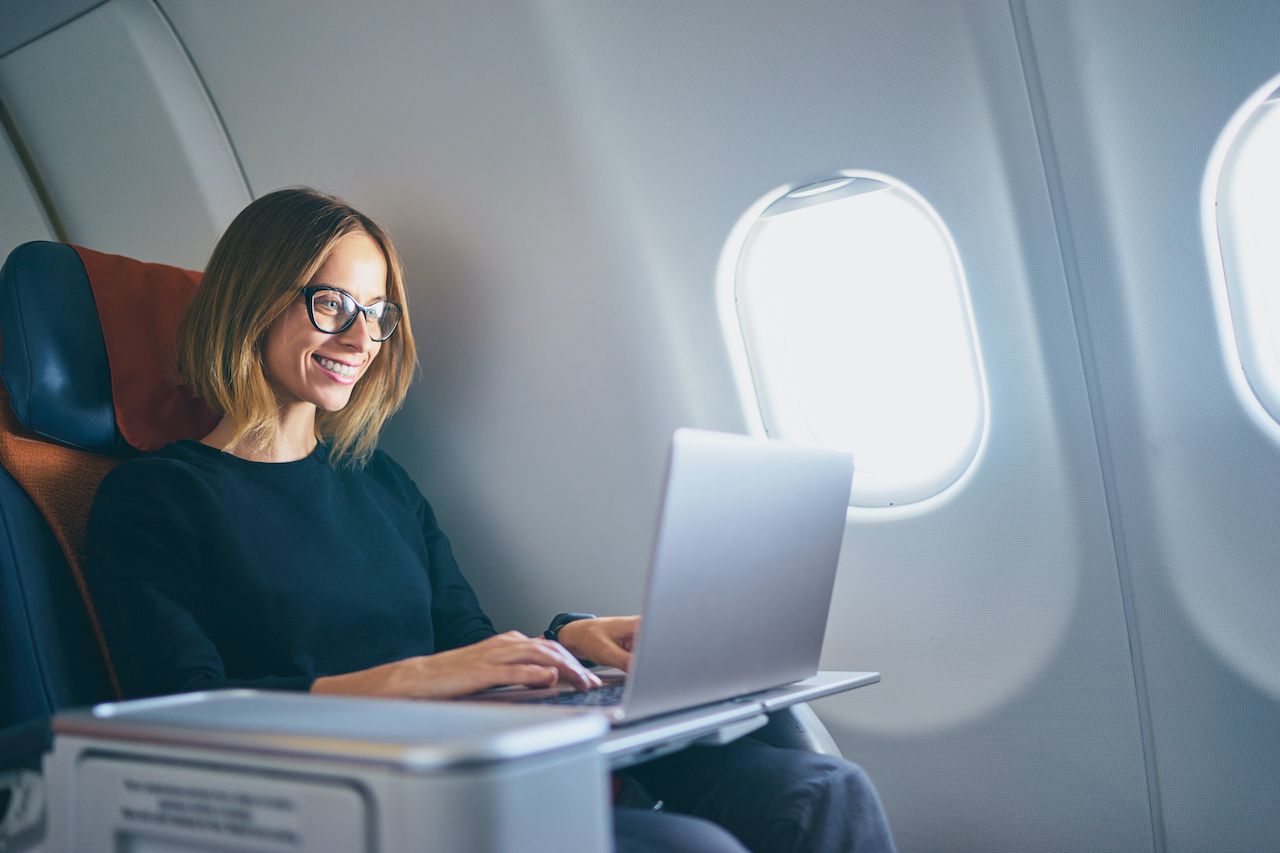Every now and then, a cliched saying works just as well in reverse. When traveling, it’s often hard to believe it if you can’t see it — and much like humidity wreaks havoc on oily skin, sudden changes in setting can be painful or damaging to the eyes. The change of climate, airplane cabin pressure, or one of a myriad of environmental factors can wreak havoc on your eyes when you travel. Redness, irritation, and general discomfort are some of the symptoms that may manifest upon stepping into new territory, whether that’s a coastal town two hours away from home or a rainforest in another hemisphere. Here is how to take care of your eyes when you travel, according to professional ophthalmologists.

How to Protect Your Eyes When You Travel, According to Experts
Bring a backup pair of glasses.

Photo: kudla/Shutterstock
Travel can be hectic — fortunately, one of the easiest ways to protect your eyes from some of the stress is as simple as doubling up on what you already do. Bringing a second pair of glasses is an absolute must for those headed to adventure destinations where they’ll be engaging in sports such as canyoning, rock climbing, or zip lining. That said, even the leisure-lover who plans on spending the day sunbathing at the Amalfi Coast needs to be prepared with an extra pair. This way, you’re prepared in case you lose, break, or scratch yours along the way and don’t have access to your prescription. Since prescription glasses are strictly individual, a replacement may not be an option on the go, which is why you should pay a visit to your eye doctor and have a designated “travel” pair made, just in case.
Store your contact lenses properly.
The traveler relying on contact lenses — whether for personal style or ease when engaging in activities such as adrenaline sports or beach lounging — needs to be extra careful with their storage on the road. Since recirculated airplane air is very dry, you should hold off on wearing your contacts on travel days, or at least take them off just before boarding. If you’re lucky enough to fall asleep on board, make sure to take your contacts out prior to your nap, as sleeping with contact lenses may cause irritation.
Pack smart and bring your contacts case as well as a travel-size contact solution which will keep them fresh and moist. Even on a long-haul flight where you may alternate between periods of sleep and alert activity, never, ever wash your contacts with plane water. The American Association of Ophthalmology explains that water is not a viable option for lens storage or cleaning. Water is not sterile and will not protect small bacteria from getting attached to the surface of your lens — and this may result in additional irritation or even a full-blown infection.
Keep your eyes hydrated at all times.
Dry climate and fatigue may lead to redness and itchiness in the eyes. Save yourself from unnecessary pain and pack some eye drops. Lubricating eye drops provide relief and extra moisture. They are an excellent solution to have on hand when traveling in smoky and windy environments. Apply them throughout the day as needed, and make sure to always pack them in your day bag. Eye drops can be purchased without a prescription and come in TSA-approved sizes. If you tend to suffer from a more severe case of dry eyes, opt for a lubricating ointment instead. The ointment is thicker than regular drops and stays in the eyes longer. One drawback, however, is that the ointment may blur your vision, so it’s best to apply at night, right before bed.
Protect your eyes from a sunburn.

Photo: kudla/Shutterstock
Whether or not you lose or damage a pair of prescription glasses, you’ll need a third pair of glasses with you in order to actively protect your eyes on the road. While bodily sunburn can be felt more acutely and is (however ironically) more visible, the eyes can also incur damage from the sun’s ultraviolet rays. “Ultraviolet rays are the most harmful part of sunlight,” Dr. Meenakashi Gupta, an ophthalmologist at Mount Sinai Hospital in New York City, told Allure. “Too much exposure to ultraviolet light from the sun can lead to eye diseases, including cataracts, growths on the eye, and eye cancers.” The best way to protect the eyes from the harsh sun is by literally putting a barrier between the two. While a pair of sunglasses may serve as a fashion statement, you should first and foremost consider its effectiveness in blocking the sun’s UV rays and protecting your eyes from damage.
Refill your allergy medicine prescription before departure.
Before heading out on your next trip, grab an extra bottle of any allergy medication you use to prevent bouts of sneezing or a runny nose and teary eyes. A change in climate could trigger seasonal allergies or other light reactions even out of season if you’re suddenly surrounded by blooms your body isn’t accustomed to.
If you suffer from seasonal allergies and use prescription eye drops or other medication, make sure to fulfill it at home before you leave. Even though you may not have been experiencing allergies at home, a sudden change of climate and season can trigger conjunctivitis. If this happens, the eyes begin to produce histamine to fight off the allergen, which in turn leads to swelling, burning, and redness, explains the American Association of Ophthalmology. It’s best to take your allergy medication with you as drug and pharmacy laws may vary and the medication may not be available in the country you’re traveling to.